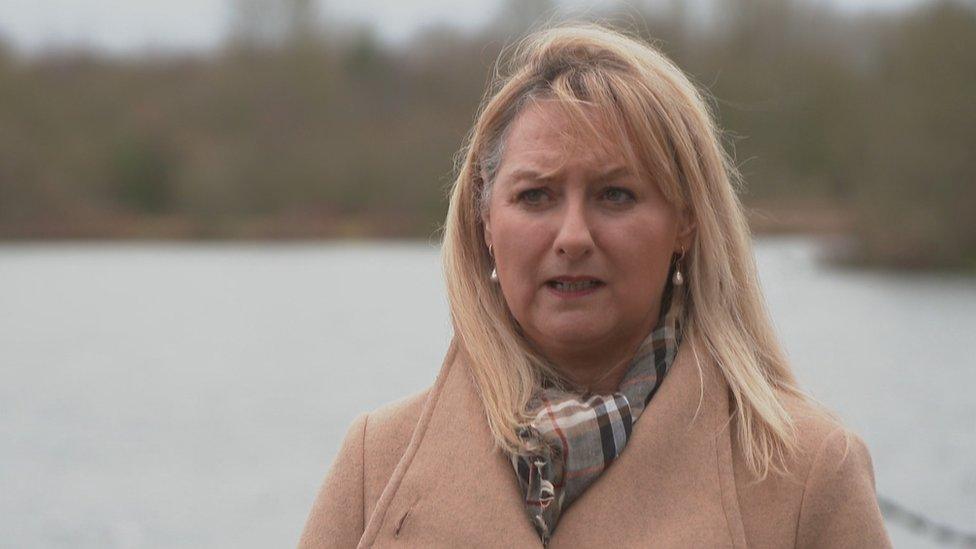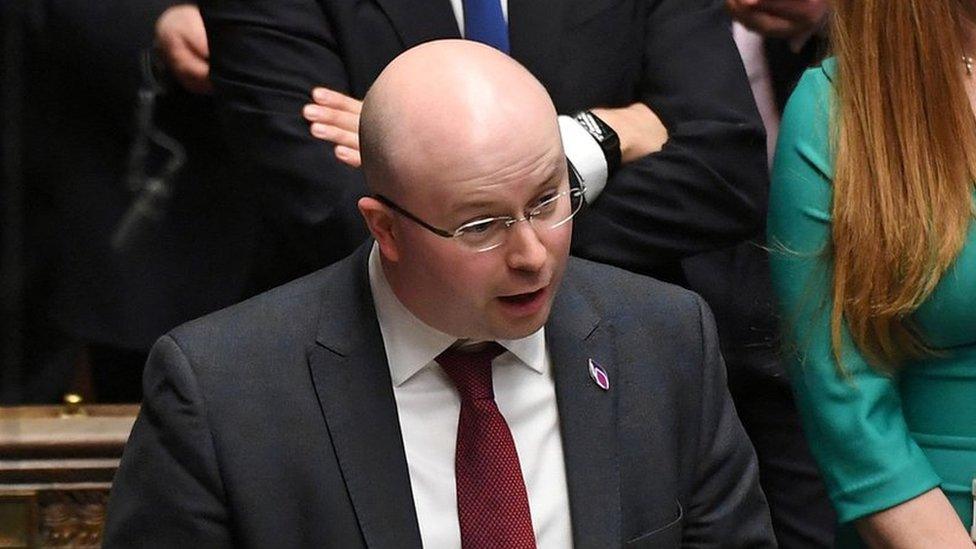SNP MP Lisa Cameron 'can't rule out forcing a by-election'
- Published

Lisa Cameron says she suffered 12 months of trauma after speaking out about a sexual harassment case
SNP MP Lisa Cameron has said she "can't entirely rule out" forcing a by-election in her constituency if she is not nominated to stand again.
Ms Cameron has represented East Kilbride, Strathaven and Lesmahagow in South Lanarkshire since 2015.
She fell out with the party leadership over its handling of an MP who was suspended for making a sexual advance to a staff member.
Ms Cameron is set to be challenged for the nomination at the next election.
She says her main focus is continuing her stay at Westminster - but she has to be "honest" about her future and may return to her professional career in healthcare.
The SNP said it was for local members to choose their candidate in a ballot.
Ms Cameron told BBC Radio Scotland's Drivetime programme she did not regret speaking out about the handling of the case involving fellow SNP Patrick Grady.
But she said the trauma of being "ostracised" by some party colleagues had made her consider her future.
She said: "I was a psychologist before I was an MP and I don't want to be in politics at any cost to my principles, as a psychologist and as a human being.
"I've never said that I plan to force a by-election... I have just been honest and said I could not rule that out because one doesn't know what could happen."

A police investigation into allegations against Patrick Grady was dropped
Ms Cameron initially spoke out after former Westminster leader Ian Blackford said in a group meeting that MPs should offer their "absolute full support" to Patrick Grady.
The Glasgow North MP was suspended from Parliament for two days last year after he was found to have made a sexual advance to a teenage SNP member of staff.
A police investigation into the allegations was later dropped and Mr Grady, who had "stepped away" from SNP membership, had the party whip restored in December.
Ms Cameron said a challenge being launched to her nomination bid had not come as a surprise.
She said: "I've had a terrible 12 months of ordeal where I've needed counselling from the welfare services in Westminster.
"I knew that I had difficulties in my relationship with the party.
"In fact, at the time when I spoke up in a meeting for the victim of sexual harassment in the Patrick Grady case, the victim himself had said to me this is likely to impact your career in the future."
'Toxic and bullying'
She added: "My children have said to me, when they've seen me in tears and upset about the situation that unfolded, mum why don't you just go back to being a doctor because that would be better for everybody.
"That's quite emotive for me.
"I want to have a career in public service and I want to represent my constituents, but I won't continue in politics at any cost to my principles, my integrity and what I think is right."
Ms Cameron said the SNP had to learn lessons from the Patrick Grady case and respond to future allegations in a more supportive way.
"The victim in this case lost his livelihood and experienced a very traumatic time," she said.
"To be quite frank, there wasn't sufficient support for that person going through that ordeal, speaking up and being very brave about it.
"I was most definitely ostracised for a period of time. Colleagues didn't speak to me. It felt very isolating and lonely and it's not a situation I would wish on anyone else. It felt very toxic and bullying."
An SNP spokesperson said: "With a Westminster election nearing, people across Scotland will soon have the chance to vote SNP to reject Westminster's cost of living crisis and elect SNP MPs who will work for the better, fairer independent future that Scotland deserves.
"A number of sitting SNP MPs will be involved in selection contests following the introduction of new constituency boundaries and it's for local members to choose their candidate in a ballot."